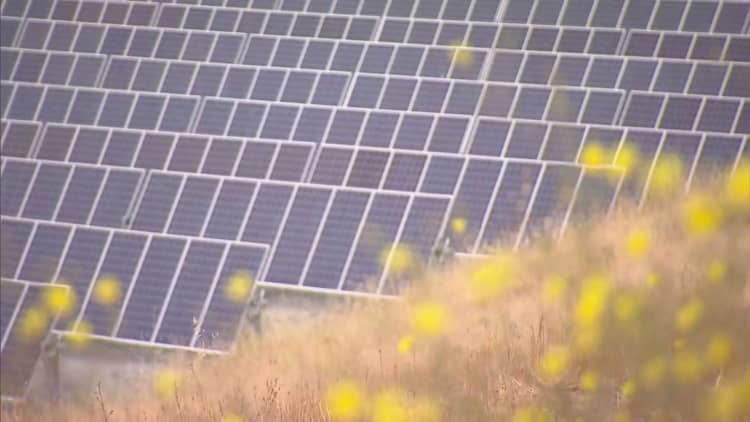
A federal trade agency ruled on Friday in favor of U.S. solar panel manufacturers seeking protection from imports, a move that will potentially disrupt demand for fast-growing renewable energy installations.
The U.S. International Trade Commission's preliminary finding that imports harmed U.S. manufacturers means President Donald Trump will get to decide whether to slap sanctions on foreign solar panels and modules or take other actions.
The decision by the four voting members was unanimous, Reuters reported. The commission must now make recommendations to the Trump administration by November.
The White House said it would "examine the facts" before imposing tariffs, Dow Jones reported.
Bankrupt solar panel-maker Suniva filed the complaint with the U.S. International Trade Commission earlier this year, arguing that a surge in imports of cheap foreign panels and modules was putting U.S. manufacturers at risk. Along with SolarWorld, another bankrupt panel maker, Suniva said the flood of overseas supplies directly contributed to its insolvency.
The two companies sought penalties of 40 cents per watt on imported cells and asked the court to set a floor price of 78 cents per watt on solar modules, or groups of solar cells.
"Suniva is gratified that the ITC has found that a surge of imports into the U.S. has decimated the American CSPV cell and module manufacturing industry," Suniva said in a statement. "We brought this action because the U.S. solar manufacturing industry finds itself at the precipice of extinction at the hands of foreign market overcapacity."
The motion was opposed by broad swaths of the solar power industry. Led by the Solar Energy Industries Association, the opponents say tariffs will raise the cost of solar panels and sink demand for installations, hurting the industry as a whole. They allege Suniva and SolarWorld's bankruptcies are due to poor business decisions.
"Today's ITC ruling moves this trade case to a remedy stage, where we must continue to fight for a common sense resolution," SEIA tweeted on Friday. "As the trade case enters a remedy stage, we urge our partners to stay active and engaged as we keep working to #SaveSolarJobs."
Shares of solar panel maker First Solar were briefly halted on the Nasdaq due to volatility. Shares were up more than 5 percent after the decision. Meanwhile, shares of Vivant Solar, one of the largest solar installers, fell nearly 6 percent.
The Guggenheim Solar exchange-traded fund was roughly flat.
Suniva and SEIA each commissioned reports that showed a ruling for their opponent would result in devastating job losses. An independent analysis by Bloomberg New Energy Finance performed for Utility Dive found a ruling for Suniva would create 6,400 jobs at most and "downstream job losses would almost certainly exceed any manufacturing gains."
Solar power accounted for almost 374,000 jobs in the U.S. generation space, according to the Department of Energy. That accounts for 43 percent of all employment in the industry, compared with 22 percent from fossil fuel generation.
Installations of large, utility-scale solar generation plants grew by an average rate of 72 percent between 2010 and 2016, the fastest among all power generation technologies. The cost of these generators fell 21 percent between 2013 and 2015, according to the U.S. Energy Information Administration.


